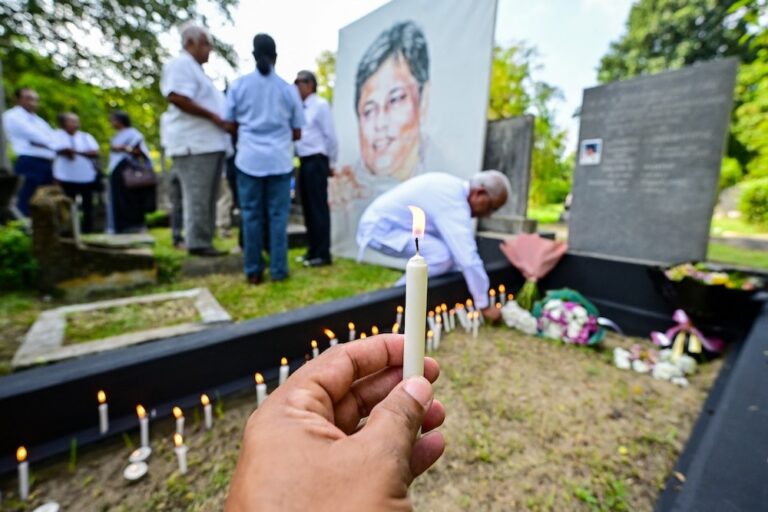(FMM/IFEX) ? The following is an FMM press release: Chief Justice’s extempore comments violate freedom of expression, prevent fair hearing and compromise independence of judiciary in Aksharaya case According to a Lanka E-News news report datelined 31 July 2007, in a Supreme Court hearing on an impugned decision by the Public Performances Control Board to […]
(FMM/IFEX) ? The following is an FMM press release:
Chief Justice’s extempore comments violate freedom of expression, prevent fair hearing and compromise independence of judiciary in Aksharaya case
According to a Lanka E-News news report datelined 31 July 2007, in a Supreme Court hearing on an impugned decision by the Public Performances Control Board to permit screening for adult audiences of the film “Aksharaya”, the Chief Justice purportedly made remarks from the bench which the FMM views as having grave implications for freedom of expression in Sri Lanka. (See: http://www.lankaenews.com/English/news.php?id=4481&PHPSESSID=562d4e259882c487f9a9c6bcb4268cc3 )
FMM does not wish to evaluate the relative merits of the Chief Justice’s reported views on culture, morality and social values, or the intemperate, personal and intimidatory nature of some of those reported remarks. But we note and underscore the chilling effect on freedom of expression that is likely to result from the judiciary taking upon itself to arbitrate and pass judgement on such matters. In a free, open and democratic society, the freedom of artistic expression to explore complex social and moral issues is pivotal. The potentially controversial nature of such issues is not an acceptable basis for the restriction of artistic freedom, nor are members of the judiciary entitled to impose their own moral and social outlook on society.
Nonetheless, we fully acknowledge the need for the appropriate regulation of artistic expression, according to well-established principles, including the certification of material for audience suitability. This is the task of the Public Performances Control Board, which comprises persons with the knowledge and experience to balance the public interest in regulation with freedom of expression and artistic merit. Likewise, it goes without saying that we recognise the role of the judiciary in upholding the law relating to freedom of expression in such matters as defamation. In our view, the judiciary should be at the forefront of the institutional protection and promotion of freedom of expression, subject to internationally recognised limitations on the exercise of that fundamental right, rather than act as a restraining agent on free expression.
However, in the present case, the remarks allegedly made by the Chief Justice are a clear and unjustifiable intrusion upon freedom of expression in that they are, in effect, an imposition of the Chief Justice’s personal moral perspectives on the subject matter of the film. This is totally unacceptable in a democratic society. We believe that the Public Performances Control Board struck the appropriate balance between the public interest in regulation and freedom of expression with regard to this film, in restricting viewing to adult audiences only. The judiciary should similarly respect the right and capacity of adult Sri Lankan film-viewers to come to their own conclusions about the film and its content.
FMM further notes that the Supreme Court has ordered the Public Performances Control Board to review its decision, but in the context of the Chief Justice’s comments, it has, in effect, substituted its own substantive judgement with that of the Board with regard to this film. The Court has thereby extinguished any prospect of a fair and unfettered exercise of discretion by the Board in its review. This negates the purpose of the Board and sets an inhibiting precedent for its future activity. Moreover, in a continuing and disturbing trend, the Supreme Court has revived the prospect of the use of contempt powers, which underscores the currently unacceptable judicial attitude to the proper role of the law of contempt and the critical need for reform. The oppressive consequences for freedom of expression of these developments need no reiteration.
FMM is firmly of the view that the Chief Justice’s gratuitous comments have prevented a fair hearing of this case, diminished the standards of judicial conduct, compromised the independence of the judiciary as well as that of the Public Performances Control Board, gravely impinged on the freedom of expression and artistic freedom in Sri Lanka, and set a most unfortunate precedent. FMM therefore unreservedly condemns the Chief Justice’s reported remarks, and hopes that an appropriate retraction will be made so as to create a more conducive atmosphere for free expression and artistic freedom in Sri Lanka.


